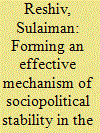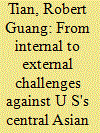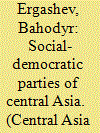| Srl | Item |
| 1 |
ID:
088546


|
|
|
|
|
| Publication |
2009.
|
| Summary/Abstract |
Armenia can be considered as the Switzerland of the Caucasus, both having a mountainous, lacustrine, and landlocked territory. Armenia's current borders have been unable to contain the marvels of its ancient civilization; of its scattered nationality; and its historical heritage. The solidity of its culture has clashed during centuries with an unstable surrounding environment, as the Caucasus has been an area of confluence and contrasts. Historically Armenia has been a country located between empires, the Romans and the Parthians; the Arab and the Byzantine, and found itself "as a vessel of fragile earthenware, obliged to journey in company with many vessels of iron." Thus, Armenia has been a country between empires, but also a country linking empires; a nation between clashing cultures, but also a nation linking cultures, and people. Armenia, then, has been a launching pad for a new beginning; it will be the aim of this paper to find out if Armenia also marks a new interpretation of current policies linking development and security concerns.
|
|
|
|
|
|
|
|
|
|
|
|
|
|
|
|
| 2 |
ID:
088552


|
|
|
|
|
| Publication |
2009.
|
| Summary/Abstract |
Independent Tajikistan is seeking diverse contacts with all interested states. Under Soviet power the Central Asian republics remained in the shadow of the rest of the country, the disintegration of which finally gave them a chance to develop relations with other countries. At first, the world community remained indifferent to their existence and limited itself to general declarations. The People's Republic of China, however, became aware that the three new Central Asian states in its northwestern provinces radically changed the foreign policy context.
|
|
|
|
|
|
|
|
|
|
|
|
|
|
|
|
| 3 |
ID:
088553


|
|
|
| 4 |
ID:
088543


|
|
|
|
|
| Publication |
2009.
|
| Summary/Abstract |
The oil pipeline projects overshadowed the conflict in South Ossetia from its very beginning. The TV audience was especially impressed by the picture of the Azpetrol tank cars burning somewhere in Georgia. The Caspian oil market promptly responded to the warfare: British Petroleum, the BTC operator, suspended oil pumping along this route; the same was done on the Baku-Supsa pipeline; and the Poti and Kulevi oil terminals were left idling.
Later numerous surveys and analyses stressed the economic aspects and calculated the losses sustained by Azerbaijan and the Western oil companies. It seems that the political analysts were more concerned about how much the war cost Azerbaijan and British Petroleum in lost profit and how many million tons of oil did not reach the market than about anything else. As Azerbaijan and the BTC shareholders regained their lost profits, the issue gradually retreated into the background.
|
|
|
|
|
|
|
|
|
|
|
|
|
|
|
|
| 5 |
ID:
088541


|
|
|
|
|
| Publication |
2009.
|
| Summary/Abstract |
At the current stage of Russia's development it is extremely important to create an effective mechanism of sociopolitical stability in the Southern Federal Okrug (SFO). The creation (drawing up) and continuous functioning of this mechanism is a necessary prerequisite for the sustainable economic development of the Russian South (and of all the territories that belong to it), as well as the country as a whole.
The federal government is becoming increasingly aware that new transportation projects can be only implemented in the Caspian region if military and political security both here and throughout the Northern Caucasus is ensured. In turn, the new transit systems in the Caspian are not only economically advantageous projects for Russia, but also an effective way to protect its geopolitical interests in the Caspian-Black Sea region.
|
|
|
|
|
|
|
|
|
|
|
|
|
|
|
|
| 6 |
ID:
088549


|
|
|
|
|
| Publication |
2009.
|
| Summary/Abstract |
With the 9/11 event as the baseline, America's awareness of the strategic importance of Central Asia and the latter's weight in the U.S. global strategy was greatly changed. According to Charles Manes, the 9/11 terrorist attack enabled the U.S. to "discover Central Asia." This attack has straightened out the uncertainty due to confusion within the U.S. Government about the importance of the Central Asian area to the U.S. and enabled the U.S. to suddenly realize the important advantage of the five Central Asian nations in the global geopolitical pattern. However, the sympathy of the Central Asian nations, Russia and China for the U.S. on the terrorist attack and the warm help from the Central Asian nations to U.S.'s Taliban attacks in Afghanistan and to the U.S. military actions against al-Qa'eda, facilitated the U.S. army in Central Asia to gain the Manas Air Base and the Karshi Khanabad Airport (also called K2 Base). This symbolized a turning point for the U.S. to access the Central Asian area in one stroke. By stationing in Central Asia, the U.S. became a remarkably important power in Central Asia and nearby
|
|
|
|
|
|
|
|
|
|
|
|
|
|
|
|
| 7 |
ID:
088547


|
|
|
|
|
| Publication |
2009.
|
| Summary/Abstract |
Regional stability and security consist of two levels-the external security of each country at the regional level and the internal security of each of them individually. A state's external and internal security are closely interrelated concepts.
It stands to reason that ensuring internal security and stability is the primary and most important task. But the external aspect also requires attention. This article takes a look at the most important problems of ensuring Kyrgyzstan's security.
|
|
|
|
|
|
|
|
|
|
|
|
|
|
|
|
| 8 |
ID:
088540


|
|
|
| 9 |
ID:
088545


|
|
|
|
|
| Publication |
2009.
|
| Summary/Abstract |
Retaining its key role in Central Asia (CA) and in the post-Soviet expanse as a whole is one of the main priorities of the Russian Federation's current policy. Carrying out this strategic task was and still is directly related to the development of security cooperation, which, in addition to being of mutual benefit in the difficult regional and international circumstances, also has a significant political and propagandist effect.
Despite the many disintegrating factors that accompanied the sovereign emergence of each of the post-Soviet republics after the collapse of the Soviet Union, their common historical past, as well as economic, cultural, linguistic, and other traditional ties continue to prompt both the Russian Federation and Central Asia to seek cooperation in both collective and national security. Whereby preference goes to bilateral relations since it is this format that implies more specific and practical forms of military cooperation and is more confidential, making it possible to avoid any negative overtones associated with ambitions and mutual lack of understanding that are particularly vividly manifested in the multilateral format.
|
|
|
|
|
|
|
|
|
|
|
|
|
|
|
|
| 10 |
ID:
088539


|
|
|
| 11 |
ID:
088544


|
|
|
|
|
| Publication |
2009.
|
| Summary/Abstract |
Anyone engaged in strategic analysis should bear in mind that according to the Prussian military thinker Karl von Clausewitz, "everything in war is very simple, but the simplest thing is difficult. The difficulties accumulate and end by producing a kind of friction that is inconceivable unless one has experienced war." "Friction" is impossible to forecast, yet it could appear at any moment and should consequently be reckoned with.
Friction makes it much harder to execute a strategic plan and fulfill tactical tasks; it may even make the planned aims unattainable. I shall use this term in my analysis of the peacekeeping operation and rehabilitation in Afghanistan.
|
|
|
|
|
|
|
|
|
|
|
|
|
|
|
|
| 12 |
ID:
088551


|
|
|
|
|
| Publication |
2009.
|
| Summary/Abstract |
The post-Cold War geopolitical transformations forced the Turkish leaders to revise their foreign policy and national security/defense concepts. The Turkish military-political circles moved away from the narrow ideas of strategy and foreign policy of the former federal security conception to a wider approach of alternative foreign policies. Early in the 1990s Turkey perceived the Caucasus and Central Asia as an alternative foreign policy sphere. It used its ethnic, linguistic, and cultural ties with the Turkic-speaking Central Asian nations to assume a leading role and establish its influence in the region.
|
|
|
|
|
|
|
|
|
|
|
|
|
|
|
|
| 13 |
ID:
088548


|
|
|
|
|
| Publication |
2009.
|
| Summary/Abstract |
the wake of 9/11 Washington stepped up its activities in Turkmenistan which, together with Tajikistan and Kazakhstan, opened its air space for the U.S. and coalition humanitarian flights to Afghanistan. American experts described it as "the only one of the five Central Asian states that is not officially a member of the Enduring Freedom coalition."
In 2002 the two countries signed an agreement on the use of Turkmenian air space by American military-transport aviation and the international civilian airport of Ashghabad for fuelling aircraft moving humanitarian cargoes to Afghanistan. This brings from $8 to 12 million into the Turkmenian budget every year.
Meanwhile, the Americans initiated and actively promoted talks on the use of other airfields: one of the three military airbases not far from Nebit-Dag, Ak-Tepe, and Mary-2. The latter was selected as the largest of the three able to receive two or more wings of strategic aviation.
|
|
|
|
|
|
|
|
|
|
|
|
|
|
|
|
| 14 |
ID:
088550


|
|
|
|
|
| Publication |
2009.
|
| Summary/Abstract |
From the very beginning the relations between Southern and Western Rus/Ukraine have been far from simple and can be best described as ambivalent. We all know that Rus as a political unit came into existence amid incessant clashes with nomadic Turkic tribes-Pechenegs (Becheneks), Torks (Uzes), and Polovtsians (Kumans or Kypchaks)-pressing in from the Asian steppes. The Kievan rulers were no "meek lambs" either: they destroyed the Kingdom of the Khazars, the state with Turkic ethnic roots. Prince Svyatoslav's inroad in the 960s into their lands when he captured Sarkel and plundered Itil and Semender was a weighty contribution to the Khazars' sad fate.
|
|
|
|
|
|
|
|
|
|
|
|
|
|
|
|